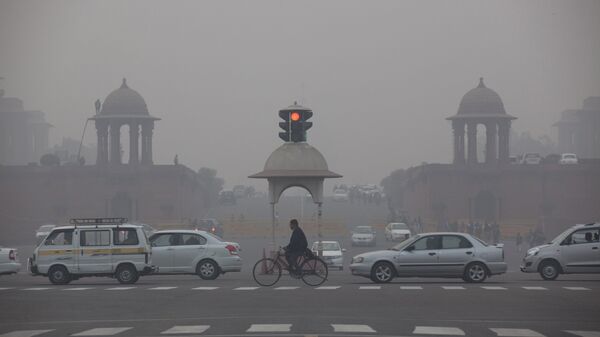New Delhi (Sputnik): India ranks among the lowest five out of 180 nations when it comes to the Environment Performance Index. While India is doing well on certain parameters of environment protection, a lot of work is still required, said Indian Environmentalist Harjeet Singh on World Environment Day.
India's new Minister for Earth Sciences Dr Harsh Vardhan today tweeted: "Let's all take a pledge to adopt #GreenGoodDeeds and contribute towards our Mother Earth!" with a video of him planting a sapling.
On #WorldEnvironmentDay, let’s all take a pledge to adopt #GreenGoodDeeds and contribute towards our Mother Earth!
— Dr Harsh Vardhan (@drharshvardhan) June 5, 2019
I request all of you to share with me your today’s green good deed with pics! Take a look at mine! @UNEnvironment @MoHFW_INDIA @moefcc pic.twitter.com/OiGrolM7mO
In an interview, Environmentalist Harjeet Singh, the Global Lead for Climate Change at ActionAid International, a non-governmental organisation, touched upon various environmental concerns affecting the country:
Sputnik: How well is India doing to protect its environment? Has the country taken any substantial steps to prevent climate change?
Singh: Overall, India's performance needs serious improvement. India has been in bottom five in the list of countries ranked on the Environment Performance Index (EPI). Our rank on EPI was 177 out of 180 and when it comes to Air Quality (AQ), we are ranked 178. So, that is clearly not acceptable by any standards. When we talk about climate change, there are certain parameters on which India is doing well. Solar energy is one sector where India is improving. But there are many other aspects including dealing with protecting natural forests where we are not doing enough.
Sputnik: How does political leadership in India impact the environmental concerns? Has any government been better than others in the quest to protect the environment?
Singh: Over the last few years, the economic model that we have adopted has led to the degradation of environmental norms continuously. We have witnessed that for the last three decades. The problem is that whichever political party comes to power looks for economic growth, with their whole and sole focus being around improving the GDP. Therefore, environmental concerns and norms are often seen by them as barriers to growth. This has led to quite a substantial amount of degradation of the ecosystem. Climate change would be the global example of what happens when environmental concerns are ignored.
READ MORE: Urban India Heading Towards Embracing Non-Motorised Transport System — Experts
Sputnik: Do you believe that average people in the country are well aware of the environmental concerns? What responsibility do you see them holding for environmental protection?
Singh: Everything cannot be dumped on the government. The people of the country too should pro-actively participate in environmental conservation. There was a hilariously iconic picture last year during the festival of Diwali where a lady was wearing a pollution mask and yet bursting a fire cracker. So, we can clearly see that the problem is not a lack of awareness. People like her are aware of the poor environment and air quality and that's why she was wearing a mask. Yet, people in our country at times are so self-centered that they would prefer to continue their hazardous lifestyles and celebrate their festivals rather than focusing on the environment.
Sputnik: Where does India stand in terms of developing eco-friendly renewable energies like solar energy? The previous government had also talked about bringing electric vehicles to India. How do you view it?
Singh: In terms of solar and renewable energy, the Modi government had envisaged a target of generating 175 GW (gigawatts) of renewable energy, of which 100 GW had to be solar until the year 2022. India has done well to achieve more than 30% of it. But there is still an uphill task ahead to achieve the rest of it in three years. But I view it as a positive sign. Because with the target being ambitious, it indicates that industrial policies are being driven in that direction. As far as electric vehicles are concerned, we had envisaged a target of a 100% switch to electric vehicles by the year 2030. But the target was reset to 30%. There is a lot of scope in the sector of electronic vehicles. But we would require a strong political will and clear policies and systems to enable ourselves to implement the envisaged goals.
The views and opinions expressed by the speaker do not necessarily reflect those of Sputnik.

